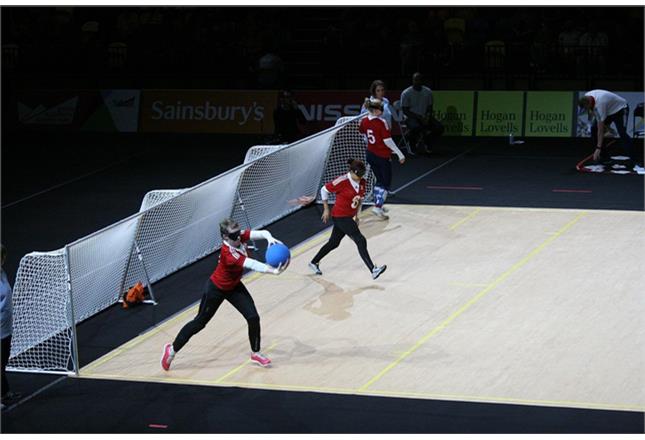
"Many of our players endured isolated childhoods with no idea they could play sport, never mind a team sport until they were introduced to goalball much later in life" - Goalball UK
What is Goalball?
As one of only two sports that do not have an Olympic counterpart, the exciting and intense sport of Goalball was created following World War II as a sport aimed towards veterans who had lost their sight, but did not make its Paralympic debut until 1976.
Described by the Paralympic website as an intense sport, which alternates between attack and defence, goalball players engage their entire body to block attacks from their opponents.
It’s a fast paced 3-a-side team game where all players wear eyeshades, and the ball has audible bells in, making it a real. With the Goalball, the aim is to score as many goals as possible past your opponent.
The Rules
Goalball is played by two teams of three players on the same size court used for volleyball (18 metres long and 9 metres wide) and each game is divided into two 12-minute halves.
The attacking team tries to score by rolling a ball containing internal bells at speed along the floor towards the opposite goal defended by their opponents. Tactile markings help players determine where they are. The ball must bounce at least once in the thrower’s landing area for the shot to count. Players lie down in front of their own goal to block the ball.
The goal stretches across the whole width of the floor (9m) making it especially difficult to defend, with teams taking turns attacking and defending.
Spectators are important in Goalball but must remain silent during play so that players can hear the ball.
The Future of Goalball
We spoke to Alliance members Goalball UK, on the importance of the presence of the sport at the Paralympics, and what they hope for its future.
How does Goalball featuring at the Paralympics benefit the sport and participation more broadly?
Every four years there is a huge uptake in the general population’s awareness and interest in goalball. From being a niche sport it quickly becomes a ‘one-to-watch’ in the media and the Paris 2024 Paralympics will be no different.
In our community so many players, coaches and even board members got involved with goalball because they experienced it at London 2012!
For a lot of our players they also get to appreciate what can be possible through goalball. Our Performance Pathway offers routes to competing for Great Britain and having that opportunity laid out is incredibly motivating for a young player. The independence and travel experiences, not to mention the friendships, are all part of it.
Our Performance Pathway offers routes to competing for Great Britain and having that opportunity laid out is incredibly motivating for a young player. The independence and travel experiences, not to mention the friendships, are all part of it.
Having representation for blind and partially sighted people at the highest level of sport is really important to boosting awareness too which means more support and funding for the sport at the grassroots level.
What are your hopes for the future of Goalball?
We’d love for that interest and awareness to stay in people’s minds, but more importantly we want blind and partially sighted people to know there’s a sport they can play, designed specifically for them.
Many of our players endured isolated childhoods with no idea they could play sport, never mind a team sport until they were introduced to goalball much later in life.
Goalball UK runs sessions in schools and taster sessions up and down the country as well as three levels of domestic competitions. To do this we rely on funding and volunteers so any support people can give is vital to spreading awareness of our fantastic sport.
In terms of Paralympic competition, we’re putting the hard work in now to prepare for LA 2028! We are proud to be funded by UK Sport. However, the majority of the countries that have qualified for Paris are full time athletes.
This afternoon, the Chancellor delivered her Budget speech to Parliament, outlining decisions on tax and spending.
Read moreAhead of the Chancellor’s Budget statement on 26 November, we take a look a look at the key areas to be aware of and the work the Alliance has been doing lobbying on behalf of members.
Read moreGovernment has today formally launched a consultation on reforming the role of statutory consultees in the planning system. The consultation runs for eight weeks, closing on 13 January 2026.
Read moreJoining the Sport and Recreation Alliance is pretty simple, but worthwhile!
Register now